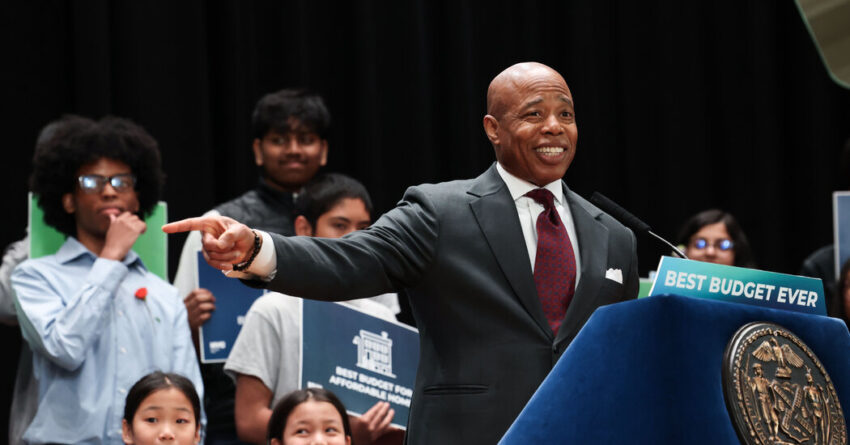Mayor Eric Adams may be unusually unpopular in New York City, his re-election hopes damaged first by a federal corruption indictment and then by his successful overtures to the Trump administration to drop the case.
But he does have one superpower at his disposal: New York City’s $115 billion budget. And on Thursday, he showed every sign of using it to enhance his chances of winning another term.
Speaking to reporters in the sparsely occupied auditorium of Bayside High School in Queens, his alma mater from the 1970s, Mr. Adams repeatedly described his executive budget as the “best budget ever,” citing new investments he was making (and cuts he was reversing) in supportive housing, after-school programs and early education.
The celebratory tenor of the address represented a stark departure from prior years, when the mayor warned that the influx of migrants to New York City necessitated budget cuts. It also seemed to ignore some of the language in the budget book his own staff had prepared, which spoke of “financial market bedlam” and “haphazard policies embraced by the new Trump administration.”
The mayor adopted a far sunnier tone. He repeatedly said he was “base-lining” programs so that they would exist in perpetuity; his staff had outfitted the public school students arrayed behind him with signs bearing the word “forever.”
“This is the best budget ever for families and young people,” the mayor said.
The upbeat speech was the culmination of a week spent crisscrossing the boroughs to advertise one new investment after another.
On Monday, it was new funding for public and supportive housing. On Tuesday, it was new funding for after-school programs. On Wednesday, he highlighted funding for the Police Department.
Some budget experts, however, said the proposal had little margin for error should the country plummet into a recession or should Congress and the president continue to slash city funding. Already, the federal government has cut more than $300 million in disaster prevention grants to New York. The budget adds no new funding to the city’s existing $8.5 billion in reserves, even though revenue growth — albeit slowing growth — is forecast in future years.
“Putting your head in the sand doesn’t protect your neck,” said Andrew Rein, president of the nonpartisan Citizens Budget Commission.
The city is expected to rely on federal funding for more than 6 percent of its total spending in the next fiscal year.
“In addition to rising recession risk, the city has not changed its assumptions for the receipt of federal funding to reflect the potential impact of recent federal actions, as many of these actions are litigated, leaving it vulnerable to choices made in Washington,” said Thomas P. DiNapoli, the state comptroller. “New York City needs to face the current fiscal reality: uncertainty in the economy, federal funding policy shifts and a possible increase in costs.”
The mayor’s executive budget proposal followed the release in January of a preliminary budget; negotiations with Adrienne Adams, the City Council speaker who is running for mayor, will continue ahead of the June 30 deadline to formally pass the budget.
After his speech on Thursday, the mayor donned a high school track-and-field sweatshirt and took questions from the press, during which he criticized Gov. Kathy Hochul for not allocating to the city a sought-after $1 billion for migrant services.
While the number of migrants in the city’s care has dropped significantly since the height of the crisis, the population still remains at nearly 40,000, the mayor said.
“The problem didn’t go away,” the mayor said, before launching into a critique of his fellow elected officials for jumping to criticize federal policies dictated by Republicans, but not state ones controlled by Democrats.
Avi Small, a spokesman for the governor, said, “Governor Hochul is allocating $1 billion to N.Y.C.’s City of Yes, $350 million for N.Y.C.’s child care and $77 million for N.Y.P.D. on the N.Y.C. subways, and we’re proud of our unprecedented partnership with City Hall to deliver results for our shared constituents.”
The national context for the mayor’s executive budget may be grim, but locally, the Democrats running to replace him have pressured him to make new investments, something the mayor seemed to tacitly acknowledge on Thursday.
“Mind you, this is what everyone was calling for,” Mr. Adams said.
